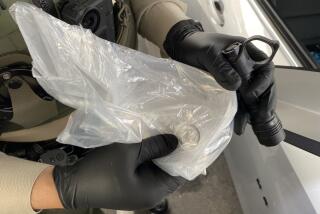COMPANY TOWN : Magnetic Anti-Theft Devices Attract Debate in Music World
- Share via
The ubiquitous little white anti-theft tags attached to millions of compact discs and cassettes are causing a rift in the music industry as retailers search for better ways to fight shoplifting.
To prevent theft, most music products are protected by tags that will activate an alarm if they pass through an electronic gate at a store’s exit. The tags are deactivated at the point of sale, so that in theory, only stolen items will cause the alarm to go off.
But shoplifting and internal theft still cost music retailers many millions of dollars a year. Enterprising thieves can beat the security system by simply peeling off the tags before heading to the exit. And applying the tags is a time-consuming--and therefore expensive--process for retailers.
The National Assn. of Recording Merchandising thought it had found a solution with a strategy called “source tagging.” Manufacturers embedded the anti-theft tags inside CD and cassette packages so thieves couldn’t see or remove them. In March, 1993, the industry group recommended using “acousto-magnetic” tags produced by Sensormatic Electronics Corp. of Deerfield Beach, Fla. Then the problems began.
“A magnetic-based system just seems like a dumb idea,” said Ron Stone, co-president of Gold Mountain, the Los Angeles company that manages the Beastie Boys, Tracy Chapman and Sonic Youth. “If you lay your credit card on the magnetic pad, it will do away with the information, so what do you think it will do with cassettes? Certainly it’s not going to improve quality.”
Studies conducted by music distributor CEMA confirm that the equipment used to deactivate acousto-magnetic tags erases high notes on professional-quality cassette tapes and causes faint music to be heard between songs, when the tape is supposed to be silent.
Stone and a collection of retailers are lobbying for source-tagging with radio frequency tags. These tags can be deactivated without harming audiocassettes--a shrinking but still important sector in the prerecorded music business--or videocassettes and floppy computer disks, which can also be damaged by magnetic fields.
The National Assn. of Recording Merchandisers “is not representing all of the music retailers. They are certainly not representing us,” said King Rogers, vice president of loss prevention for Target stores, a music retailer and strong supporter of radio frequency technology.
Jim Donio, NARM’s vice president for communications and events, said the group has studied the options and decided acousto-magnetic tags will serve retailers best.
The magnetic field required to deactivate the anti-theft tags is so small that it poses no danger to cassettes when used properly, said Sensormatic spokesman Louis Chiera. But critics worry that music store clerks won’t use the system carefully and will therefore place millions of cassettes at risk.
Such criticism led NARM to limit its source tagging plan to compact discs--which are not threatened by magnetic fields--and still eliminate 80% to 90% of music shoplifting, Donio said.
But some retailers fear shoplifters will simply turn their attention from CDs to unprotected cassettes. They also worry that once manufacturers begin installing magnetic tags on CDs, they will be predisposed to using them on other kinds of music products, including cassettes.
Critics believe the NARM board favored the acousto-magnetic tags because about three-quarters of the voting members had already invested in Sensormatic anti-theft systems and that scrapping the investment to go with safer radio frequency tags was financially unpalatable. Donio denies that cost played a role in the decision.
Dave Shoemaker, vice president of business development for radio frequency tag maker Checkpoint Systems of Thorofare, N.J., said NARM’s problems will only grow as more kinds of retailers sell music products. Walgreen’s drugstore chain and bookseller Barnes & Noble both sell recorded music, and they prefer radio frequency tags because they are better suited to their merchandise, according to loss prevention executives at both companies.
So far, NARM remains undeterred by the protests. The retailers group is in the midst of its second trial run with source tagging, and it expects to begin using the tags industrywide by the first half of next year, Donio said.
The Camelot Music chain participated in the first trial by moving more than 8,000 source-tagged copies of the “Tales From the Hood” CD through 300 of its stores. Store operations manager Jerry Dolan says the North Canton, Ohio-based chain is eagerly awaiting more source-tagged titles in the future.
“We’ve done this whole thing for the good of the retail marketplace,” Donio said. “We are hopeful that it will dramatically impact shoplifting, and at the end we can say it’s been a long, hard drive, but it’s been worth it.”
More to Read
The biggest entertainment stories
Get our big stories about Hollywood, film, television, music, arts, culture and more right in your inbox as soon as they publish.
You may occasionally receive promotional content from the Los Angeles Times.











